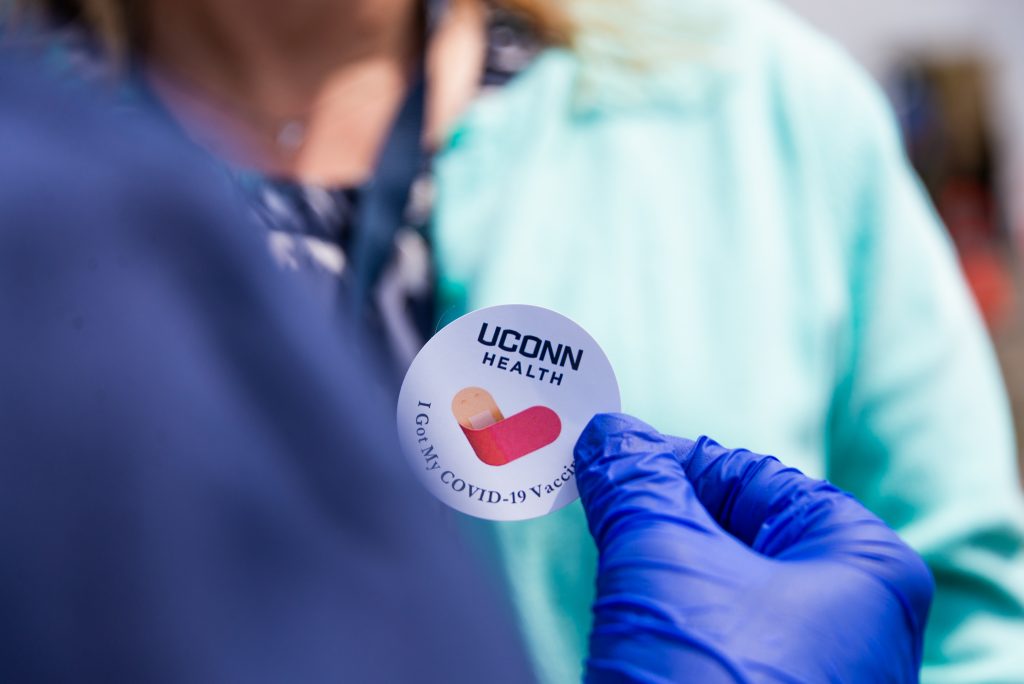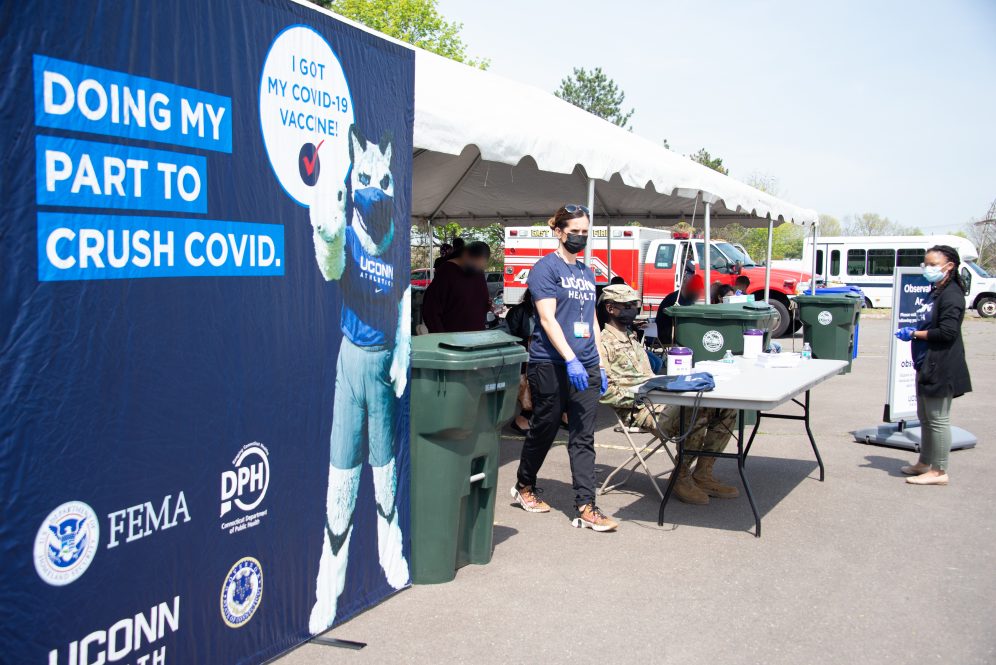Employees at UConn’s Storrs and regional campuses have overwhelmingly complied with the University’s COVID-19 vaccination policy, a measure enacted to help avoid spread of the virus and maintain in-person operations.
As of the most recent figures on the University’s COVID-19 Dashboard, nearly 98% of employees complied with the policy by either submitting information on their vaccination status or requesting an exemption or deferral.
Among all employees, about 95% submitted proof of vaccination on or before the Oct. 15 deadline spelled out in the University’s policy, which preceded Gov. Ned Lamont’s executive order applying to all state employees.
The success of UConn’s employee vaccination policy mirrors that of the student policy, in which 98% of Storrs residential students are fully or partially vaccinated. The rates range from 91% to 98% among non-residential students taking in-person classes at the regional campuses.
In both the student and employee populations, large numbers opted to receive the COVID-19 vaccination even before it was required by policy, greatly helping UConn’s work to curb spread of the virus so classes and activities can remain in person.
“UConn community members have demonstrated their care and concern for each other in many ways throughout the pandemic, and their overwhelming compliance with the vaccination policies has been critical to the well-being of our campuses,” says Dr. Andrew Agwunobi, UConn’s interim president and chief executive officer of UConn Health.
“We often refer to ourselves as ‘One UConn’ in the ways that our shared values unite us regardless of our home campuses, our backgrounds, and our roles at the University,” he adds. “These high vaccination compliance rates also reflect our commitment to addressing the pandemic’s challenges together, protecting ourselves and each other.
“I am proud to be part of such a caring and conscientious community, and I thank all of you for the important work you do,” he says.
In addition to the 95% of employees who are vaccinated, about 3% of Storrs and regional campus employees have complied with the policy by requesting medical or religious exemptions or deferrals, which UConn Human Resources reviews individually.
All told, that leaves about 2% of UConn’s permanent and temporary employees deemed as non-compliant under the policy’s definitions.
However, the number of actively employed workers who have not complied is lower than that percentage because some of the 2% are away from campus for reasons such as an academic sabbatical or medical leave. They are exempt from the policy until they return to campus, but still are counted in the employee population.

Christopher Delello, UConn’s Chief Human Resources Officer, said they are meeting with non-compliant employees individually to determine if they face any special circumstances, such as technical problems with uploading their data or difficulty in understanding the instructions.
HR also is reaching out to non-compliant employees who might not have seen the reminders because they do not have regular email access, such as if they work in non-office settings or only work on campus in limited roles tangential to their other professions.
However, disciplinary measures could be ahead for the employees who have declined to respond to multiple HR reminders about the policy despite the targeted outreach. They are being issued letters of counseling, a formal but non-disciplinary step that requires them to respond within five business days.
If the employees do not respond to the letters of counseling, the University can then start formal progressive discipline, which will follow the guidelines of the applicable union contract or governing University policies and procedures. Depending on the circumstances, that discipline could include letters of warning and reprimand, suspension, demotion, and termination from employment.
“We have taken an approach of being compassionate and understanding that scheduling conflicts occur and other life events can get in the way. But at this point, we feel we have given an adequate amount of time for people to respond and that it is appropriate to move to the next steps in the process,” Delello says.
HR figures show that almost 100 percent of non-union confidential exempt employees and staff members represented by the UCPEA bargaining unit (UConn Professional Employees Association) have complied with the policy.
Delello says the AAUP (American Association of University Professors) and classified bargaining units representing other UConn employees have also strongly supported the HR department’s work, encouraging their members to comply and underscoring the policy’s importance in providing healthy, safe workplaces.
The vaccination figures reflect employees at the Storrs campus and those at the School of Law, UConn Extension, and the campuses in Hartford, Stamford, Waterbury, and Avery Point.
UConn Health’s compliance is separately monitored and tabulated due to its distinct status as an academic medical center with unique populations of front-line healthcare workers and others.
The figures also do not include the UNITE HERE employees who work in UConn’s dining halls; employees of the independent UConn Foundation; volunteer workers; and graduate assistants, whose vaccination figures are captured in student tabulations.
UNITE HERE’s human resources personnel recently launched a system that mirrors UConn’s vaccination process and forms, and UConn will start providing on-campus testing for them soon at HR’s headquarters in the Brown Building at the Depot Campus.
UConn Health is training UConn nursing students in its medical records programs and self-swab training to help increase testing availability at the Brown Building. UConn employees also can get vaccinations and testing through UConn Health, CVS Pharmacy, and some other providers. The University also plans to offer booster shots at the Brown Building for employees and will soon announce specifics.
UConn HR partnered with the state Department of Public Health, the Eastern Highlands Health District, UConn Health, and the Division of Public Safety to become one of the first entities in the region and at the University to provide on-site testing when the virus began to spread, and to offer vaccinations as they became available.
As the need became more pronounced in the early months of the pandemic, the services were expanded to Hawley Armory for faculty and staff, and for vaccinations available to the public.
“Having an on-site program helped immensely with our testing and vaccination efforts. The partnership with our employees is an important factor in preserving our community’s health, while also providing a notable service to the region in which we work and live,” Delello says.
“It was a large effort for HR to lift up and start these programs, but the results have certainly proven their value and effectiveness, and I want to thank our HR team members for their hard work and all employees who participated,” he says.



